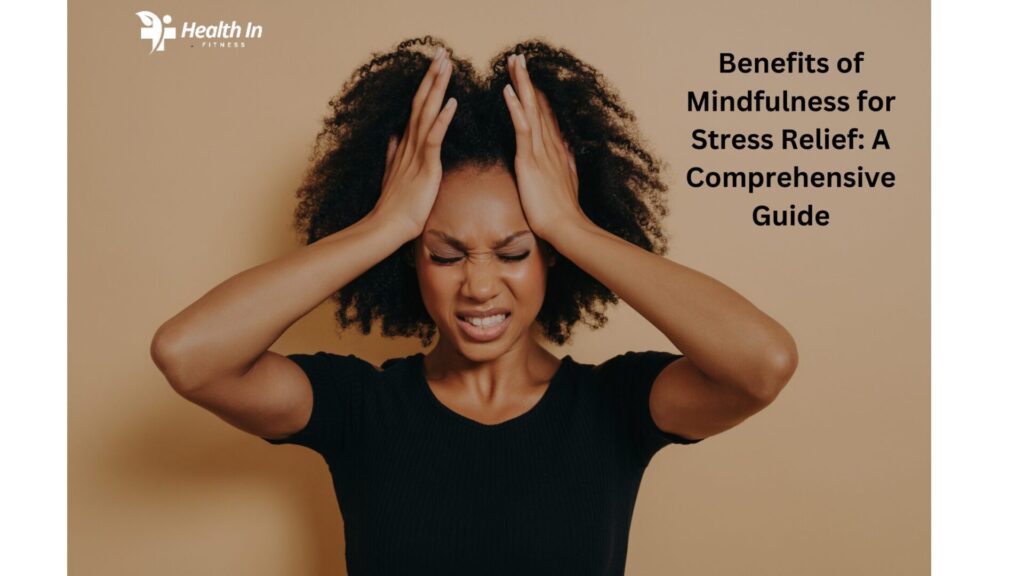
In today’s fast-paced, high-pressure world, stress has become a common experience for most people. While some stress is normal, chronic stress can negatively affect both physical and mental health, leading to conditions like anxiety, depression, high blood pressure, and heart disease. One of the most effective and scientifically backed benefits of Mindfulness for Stress Relief is mindfulness. By practicing mindfulness, individuals can cultivate a sense of calm, reduce anxiety, and improve their overall well-being.
This comprehensive guide will delve deep into the benefits of mindfulness for stress relief, offering valuable information on how mindfulness works, its scientific basis, and practical strategies for incorporating mindfulness into your daily life. By the end of this post, you’ll have a clear understanding of how mindfulness can transform your approach to stress and enhance your mental and physical health.
What Is Mindfulness?
Mindfulness is the practice of paying attention to the present moment with non-judgmental awareness. It involves observing thoughts, emotions, and sensations as they arise, without getting caught up in them or reacting impulsively. Instead of dwelling on the past or worrying about the future, mindfulness helps individuals stay grounded in the present moment.
Mindfulness is rooted in ancient meditation practices, particularly in Buddhism, but it has gained widespread attention in modern psychology and medicine for its benefits in stress reduction, emotional regulation, and overall mental health.
At its core, mindfulness cultivates awareness and acceptance, allowing individuals to respond to stress with clarity and calm rather than reacting out of fear or anxiety.
The Science Behind Mindfulness for Stress Relief
Over the past few decades, a growing body of scientific research has confirmed the effectiveness of mindfulness for reducing stress and improving mental health. Studies show that regular mindfulness practice can alter brain structures and functions, enhancing emotional regulation and reducing the physiological response to stress.
How Mindfulness Affects the Brain and Body
- Reduces Activation of the Amygdala (Stress Response): The amygdala is the part of the brain responsible for processing fear and triggering the body’s “fight or flight” response. Chronic stress leads to overactivity of the amygdala, which heightens feelings of anxiety and tension. Mindfulness meditation has been shown to decrease amygdala activity, leading to a calmer response to stress.
- Increases Prefrontal Cortex Activity (Emotional Regulation): The prefrontal cortex is involved in decision-making, planning, and regulating emotions. Mindfulness strengthens this part of the brain, improving the ability to manage stress and emotions more effectively.
- Lowers Cortisol Levels: Cortisol is a hormone released by the adrenal glands in response to stress. While it plays a necessary role in the body’s stress response, chronic elevation of cortisol levels can lead to health problems such as high blood pressure, immune system suppression, and weight gain. Research shows that mindfulness can reduce cortisol levels, helping the body recover from stress more quickly.
- Improves Neuroplasticity: Neuroplasticity refers to the brain’s ability to change and adapt. Mindfulness meditation encourages neuroplasticity by strengthening connections between brain regions responsible for attention, empathy, and emotional regulation. This makes it easier to manage stressful situations with resilience.
Key Benefits of Mindfulness for Stress Relief
1. Reduces Emotional Reactivity
One of the primary ways mindfulness helps with stress relief is by reducing emotional reactivity. When faced with stressful situations, it’s easy to react impulsively—be it with anger, frustration, or anxiety. These emotional reactions can exacerbate stress, creating a cycle of emotional distress.
Mindfulness teaches you to observe emotions as they arise without immediately reacting to them. By recognizing stress triggers and taking a pause, you can choose a more thoughtful and measured response. Over time, this reduces the intensity and frequency of negative emotional reactions, making it easier to navigate stressful situations with calm.
Practical Tips to Reduce Emotional Reactivity:
- Practice the “Pause and Breathe” technique: When you feel overwhelmed, pause for a moment and take a few deep breaths before responding.
- Observe your emotions as if you were a neutral observer. Ask yourself, “What am I feeling right now?” without judging or suppressing the emotion.
- Regularly practice body scans or mindfulness meditation to build greater awareness of your physical and emotional states.
2. Improves Focus and Concentration
Stress can often lead to a scattered, unfocused mind. Racing thoughts, constant worries, and the inability to concentrate can make it difficult to accomplish tasks efficiently, further contributing to stress. Mindfulness helps cultivate a sense of focus and attention by training the mind to stay present.
When practiced regularly, mindfulness can increase concentration and the ability to stay engaged in the task at hand. This not only improves productivity but also reduces the mental fatigue caused by multitasking or constantly shifting between worries and tasks.
Practical Tips to Improve Focus:
- Incorporate short mindfulness breaks during your workday. Set a timer for five minutes to simply sit and breathe, focusing on your breath as it moves in and out.
- Use the “one-task-at-a-time” approach. Mindfully engage with one task at a time, resisting the urge to multitask.
- Practice mindful eating, where you focus solely on the experience of eating—its taste, texture, and aroma—without distractions.
3. Enhances Self-Awareness
Mindfulness helps you develop a deeper understanding of your thoughts, emotions, and behaviors. As you become more attuned to your internal experiences, you gain greater insight into how you respond to stress and what triggers stress for you.
This heightened self-awareness allows you to identify patterns that may be contributing to stress. For example, you may notice that certain thought patterns, such as catastrophizing or overthinking, lead to anxiety. By recognizing these patterns, you can take proactive steps to manage or change them.
Practical Tips to Enhance Self-Awareness:
- Start a mindfulness journal where you note your thoughts and emotions throughout the day. Reflect on how these thoughts contribute to stress or peace.
- During stressful situations, ask yourself, “What am I thinking and feeling right now?” without trying to change it. This awareness is the first step toward reducing stress.
- Practice mindfulness meditation daily to improve your ability to observe your inner landscape without judgment.
4. Reduces Physical Symptoms of Stress
Chronic stress doesn’t only affect mental health—it also manifests in the body. Headaches, muscle tension, digestive issues, and insomnia are common physical symptoms of stress. Mindfulness can help alleviate these physical symptoms by promoting relaxation and activating the body’s parasympathetic nervous system, which helps the body rest and recover.
Studies show that mindfulness-based stress reduction (MBSR) programs can significantly reduce pain and physical symptoms associated with chronic stress, helping individuals manage conditions like irritable bowel syndrome (IBS), tension headaches, and fibromyalgia.
Practical Tips to Relieve Physical Stress Symptoms:
- Practice mindful breathing exercises, which can lower heart rate and blood pressure, promoting relaxation.
- Engage in progressive muscle relaxation, a technique where you tense and then release each muscle group, helping to reduce tension and stress in the body.
- Incorporate a daily body scan meditation to bring awareness to areas of tension or discomfort in your body.
5. Promotes Emotional Resilience
Stressful events are an inevitable part of life, but how we respond to these events plays a significant role in determining our overall well-being. Mindfulness enhances emotional resilience, allowing you to bounce back from stressful situations more quickly.
By practicing mindfulness, you learn to accept difficult emotions and experiences without being overwhelmed by them. Instead of resisting or avoiding stress, mindfulness encourages acceptance, which paradoxically reduces the intensity of stress. Over time, this leads to greater emotional resilience and the ability to face life’s challenges with a calm and balanced mindset.
Practical Tips to Build Emotional Resilience:
- Use mindfulness to practice acceptance. When faced with a stressful event, acknowledge it without trying to change or avoid it. Accept that stress is a natural part of life.
- Practice self-compassion during difficult times. Instead of criticizing yourself, offer yourself kindness and understanding, which fosters emotional resilience.
- Engage in gratitude journaling. At the end of each day, write down three things you’re grateful for. Focusing on the positive can help shift your perspective and reduce stress.
6. Enhances Sleep Quality
Stress often leads to sleep disturbances, such as difficulty falling asleep or staying asleep. The more stressed you are, the more challenging it becomes to relax and fall into a restful sleep. Mindfulness has been shown to improve sleep quality by calming the mind, reducing the mental chatter that often keeps people awake at night.
Mindfulness practices, such as mindful breathing or body scan meditation, can help promote relaxation and prepare your body for sleep. Over time, this can lead to more restful and restorative sleep, which is essential for overall health and well-being.
Practical Tips for Improving Sleep with Mindfulness:
- Establish a pre-sleep mindfulness routine. Spend 5-10 minutes practicing mindful breathing or a body scan meditation to calm your mind before bed.
- Focus on your breath when you wake up in the middle of the night, allowing yourself to gently return to sleep without becoming anxious.
- Practice mindful stretching or gentle yoga before bed to relax your muscles and prepare for restful sleep.
How to Start a Mindfulness Practice for Stress Relief
If you’re new to mindfulness, getting started may feel daunting. However, you don’t need to meditate for hours a day to experience the benefits of mindfulness for stress relief. Even a few minutes of daily mindfulness can make a significant difference over time.
Step-by-Step Guide to Starting a Mindfulness Practice:
- Start Small: Begin with just five minutes of mindfulness practice each day. Gradually increase the duration as you become more comfortable with the practice.
- Focus on Your Breath: One of the simplest mindfulness practices is mindful breathing. Sit in a quiet place, close your eyes, and focus on your breath as it moves in and out. When your mind wanders, gently bring your attention back to your breath.
- Practice Mindfulness in Everyday Activities: Mindfulness doesn’t have to be limited to meditation. You can practice mindfulness during everyday activities like eating, walking, or washing dishes. The key is to bring your full attention to the task at hand and engage with it fully.
- Join a Mindfulness Program: If you’re looking for more structured guidance, consider joining a mindfulness-based stress reduction (MBSR) program. These programs, developed by Dr. Jon Kabat-Zinn, are scientifically validated to reduce stress and improve well-being.
- Use Mindfulness Apps: There are many apps, such as Headspace and Calm, that offer guided mindfulness meditations and exercises to help you build a consistent practice.
For more guidance on starting a mindfulness practice, visit Mindful.org’s beginner’s guide to mindfulness meditation.
Conclusion: The Long-Term Benefits of Mindfulness for Stress Relief
The benefits of mindfulness for stress relief extend far beyond just reducing anxiety in the moment. Mindfulness promotes long-term mental and physical well-being, improves emotional resilience, and enhances the overall quality of life. By incorporating mindfulness into your daily routine, you can manage stress more effectively, cultivate a calmer mind, and lead a more balanced life.
From reducing emotional reactivity to enhancing sleep quality, the positive impact of mindfulness is well-supported by science. Whether you’re new to mindfulness or looking to deepen your practice, the key is consistency. Just a few minutes of mindfulness each day can lead to significant improvements in your ability to handle stress and enjoy life’s moments more fully.
For more information on mindfulness and its benefits, explore The American Psychological Association’s overview of mindfulness.











